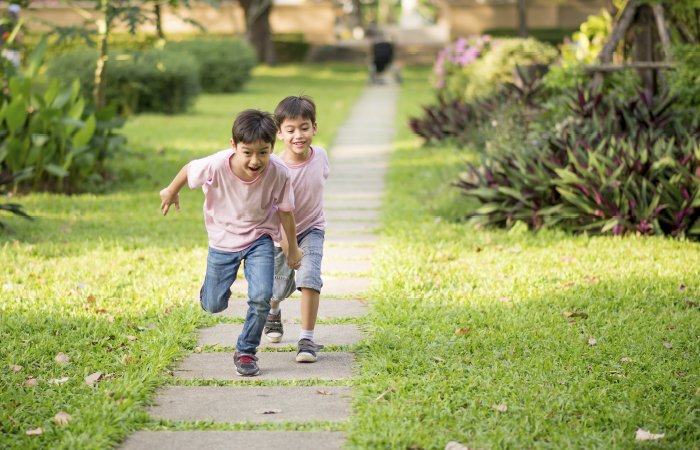How Roughhousing & Kids Play Fighting Is a Part of Normal Development
Roughhousing is an important part of developmental play for kids. Yes, it stresses out many a mindful mother, but it’s completely natural and even beneficial in many ways.

A kitten makes a sideways run to pounce on her unsuspecting sibling. Two puppies growl and nip each other, all the while thumping their tails with glee. Mama bear play fights with her cubs.
Roughhousing comes naturally to young animals (even non-predatory animals), so it should be no surprise our kids have the same instincts.
Roughhousing Is a Natural Form of Play
While it may go against your protective instincts, roughhousing has several benefits. In the book, The Art of Roughhousing, authors Anthony DeBenedet and Dr. Lawrence Cohen explain that roughhousing “makes kids smart, emotionally intelligent, lovable and likable, ethical, physically fit and joyful.”
“Roughhousing even builds self esteem as kids experience their own physical strength, especially for kids who are less assertive, or smaller than other kids their age,” explains Dr. Laura Markham. “And like other young mammals, when kids play fight, they learn to manage aggression, which makes them less likely to lash out when they’re angry.”
How Kids Benefit from Roughhousing
Let’s look at specific reasons why this form of highly physical play is helpful.
It rewires the brain, improving resilience and decision making skills
Marc Bekoff, evolutionary biologist and author of Wild Justice: The Moral Life of Animals says, “The unpredictable nature of roughhousing actually rewires a child’s brain by increasing the connections between neurons in the cerebral cortex, which in turn contributes to behavioral flexibility. Learning how to cope with sudden changes while roughhousing trains your kiddos to cope with unexpected bumps in the road when they’re out in the real world.”
Dr. Larry Cohen contends that roughhousing is beneficial for both children and parents in many ways:
“Roughhousing activates many different parts of the body and the brain, from the amygdalae, which process emotions, and the cerebellum, which handles complex motor skills, to the prefrontal cortex, which makes high-level judgments. The result is that every roughhousing playtime is beneficial for body and brain as well as for the loftiest levels of the human spirit: social awareness, cooperation, fairness, and altruism.”
It helps kids deal with aggression in healthy ways
This light-hearted play fighting, wrestling, and rough and tumble play can actually help kids learn to deal with aggression.
With high energy play, kids learn the difference between healthy roughhousing and aggression. Psychologist John Snarey writes in How Fathers Care for the Next Generation, “Children who roughhouse with their fathers… quickly learn that biting, kicking, and other forms of physical violence are not acceptable.”
It releases helpful hormones
The movement and laughter help release built-up energy and generate oxytocin in the body.
“Being active, getting sweaty and roughhousing offer more than just physical health benefits. They also protect against depression,” says Tonje Zahl, of the Norwegian University of Science and Technology.
Researchers at the NTNU worked with nearly 800 children when they were six years old and followed up at ages eight and ten to look for a correlation between physical activity and symptoms of depression. They found that the more the kids engaged in activity that induced sweating or panting, the less incidence there was of depression.
It encourages smart risk-taking
Beckoff also shares that horseplay provides an opportunity for making mistakes without fear of punishment. When dads tussle with kids, they tend to take a few risks because they know Dad will keep them safe.
It teaches kids about boundaries
As we discuss below, always teach your kids to set boundaries when playing rough. Once they see the rules upheld at home, this imprints on how they behave in the world. They also realize that Dad is much stronger than them, so clearly he is restraining to keep from hurting anyone else. Self-control and this type of logic in thinking are critical for kids.
It increases social and emotional intelligence
Rough play with dad has been linked to many social and emotional benefits for both boys and girls. Founder of The National Institute for Play, Dr. Stuart Brown, says that the “lack of experience with [roughhousing] hampers the normal give-and-take necessary for social mastery and has been linked with poor control of violent impulses later in life. When kids roughhouse they learn to tell the difference between play and actual aggression.”
How to Allow Roughhousing While Keeping Your Kids Safe
Here’s how to keep your rough-and-tumble kids safe and respectful (without you feeling like a full-time referee).
Listening is key
Roughhousing should be fun. If Dad is the ring leader, make sure he sets an example of listening to the children and watching for body language and nonverbal cues that they aren’t having fun anymore. Siblings will follow Dad’s lead. And if they don’t, step in and explain how to pay attention and stop when one considers it too much.
This is also a good time to have the “no means no” conversation. Tickling is a good chance to teach body autonomy. The child may be laughing but if they say to stop, it’s time to stop.
Set limits up front
Establish what’s ok and what’s not. If roughhousing happens daily, you might want to make a Playtime Ethics list and hang it on your fridge. (You’ll probably add to or revise these rules over time.)
Designate areas where wild play is allowed, as well as off limits areas where someone could be hurt or something could get broken. Let the kids make some of the rules so they’ll have ownership in the situation and make sure logical consequences are established and enforced.
Make sure the roughhousing is good-natured
Horseplay should always be good-natured. Make sure your child knows that when one participant stops enjoying it, it’s time to stop. Teach them what nonverbal or social cues are. Always feel free to check in with each child involved and make sure they’re still cool with it.
Assess any danger
There’s a difference between rowdy and dangerous. Sometimes kids are just loud and boisterous and it feels more chaotic than it actually is. Your instincts will tell you if there’s something to worry about, and if you’re not sure, check in with the kids and ask how they’re doing.
Keep an eye out for danger, but don’t hover or constantly judge how your kids play together. Janet Lansbury, parenting expert and author of Elevated Child Care, explains, “Trust sees children in their most positive light and gives them the best chance of succeeding. Trust places ownership of sibling relationships where it belongs – strictly between the children involved. In truth, their relationships will always be their own, so we may as well let go. We will never have the power to dictate how they feel about each other.”
Make a safe space for wild play
Clear a space in a carpeted room (or lay down blankets or nontoxic play mats) for safe wild behavior. Pillows and other soft items can help cushion a fall.
Be calm but firm
If the kids are spinning out of control, the last thing the situation needs is more worked-up energy. Take a deep breath and firmly state your intentions:
“Remember: no horseplay around the fireplace.”
“Can you see that your friend isn’t laughing anymore? Let’s take a break and make sure everyone feels safe.”
Cue kids to settle
The 5-minute notice usually works here. Plan a more calm activity for young children to shift into the next gear before asking them to focus on something else.
Some parents may worry that roughhousing kids can get so riled up they’ll never wind down, but play researcher Anthony Pellegrini says, “Some studies show kids are calmer and more ready for social play after a good rough-and-tumble.”

